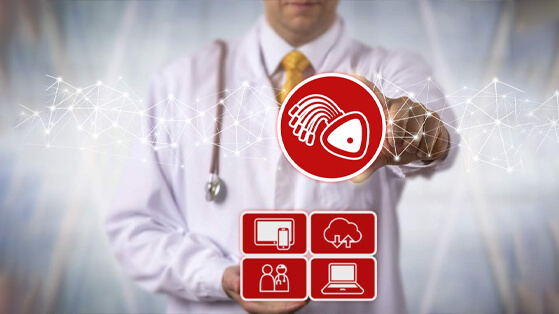Relaxing law on remote treatment: New chances for telemedicine systems

The term telemedicine is on everybody’s lips at the moment. The first project is being run in the German federal state of Baden-Württemberg and treatment over the Internet is already common practice in Switzerland. The German Medical Assembly is now discussing relaxing the law on remote treatment.
Waiting around at the surgery for the family doctor, long journeys to a doctor, especially in rural areas, or difficulties in arranging appointments with a consultant – many visits to a doctor could soon be a thing of the past. Despite regulatory hurdles, attempts are now being made in pilot projects in the German federal states of Baden-Württemberg or North Rhine-Westphalia to build on the successes achieved in other Western countries such as the USA, Great Britain and in Switzerland as well. The aim of these projects is to improve patient care over the long term in disadvantaged areas in Germany as well. Older people and people with extensive mobility problems especially could benefit from what remote treatment can offer in this area. From a technological viewpoint a telemedical consultation with a doctor would by now have been state of the art, had itnot been prohibited by the law on remote treatment that was relaxed in mid-May at the German Medical Assembly. Rural areas with a low physician density in particular can reap the benefits of telemedicine. Keyword “Shortage of doctors in rural areas”. For example healthcare workers other than doctors may attach ECG electrodes. Under the terms of the Delegation Agreement a practice nurse is also authorised to carry out this procedure, thereby supporting the doctor from a “distance”. The data from the ECG amplifier can already be sent via Bluetooth® to a mobile terminal device (for example a smartphone or tablet) and then sent via this device to a telemedical doctor’s practice.
To that end Corscience has placed on the market the COR12, a 12 channel Bluetooth® ECG which impresses with its easy application (thanks not least to the electrode contact measurement). Thanks to its flexibility, the device can be used for a wide range of telemedical solutions and it can also be combined with the HES® algorithm, an algorithm for analysing ECG data. The algorithm can be embedded and performed both in a server solution and in a (mobile) application. The compatibility of HES® with all current operating systems enables the doctor to get “a second opinion” quickly and easily via virtually any terminal device.
Since 2001 Corscience has also been developing for its customers a range of individual, customer-specific system solutions, including system solutions in the fields of mobile health/telemedicine. In many customer projects the emphasis is on integrating wireless interfaces (e.g. Bluetooth® or GSM/LTE) not only in mobile but also in stand-alone devices (e.g. AEDs or patient monitors). On the software side too our engineers work with you in developing the right solution for integrating algorithms and data transfer protocols. Drawing on their many years of project experience in the field of mobile health Corscience experts can therefore ensure maximum functionality and the smooth operation of your system in the field.
Symposium – “Quality but safe!” On July 4th in Tuttlingen
In line with this topic, you can take the opportunity at the beginning of July to meet Maximilian Wacker and Johannes Spallek at an afternoon symposium in Tuttlingen. The topic “Quality – but safe!” Is reflected in various lectures on all aspects of IT security and product and process validation. Together with our proven partner sepp.med, we welcome you to an informative discussion in the heart of the Medical Mountains in Tuttlingen.
Register now via Xing or the Medical Mountains directly and secure yourself a place.